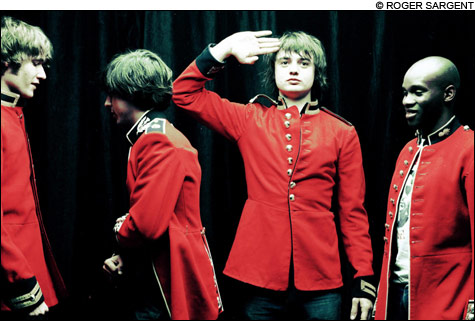
MOD: A Time for Heroes reveals just how very British the Libertines were from the start.
|
In the six years since Pete Doherty emerged as a singer/guitarist/songwriter in the Libertines — a band who were almost immediately crowned rock-and-roll saviors by the British press — he’s been arrested twice, spent two months of a six-month sentence in jail, and been in and out of rehabs that have included a three-day stint at Thailand’s Thamkrabok Monastery for heroin addiction. But not even Doherty’s regular absences were enough to hold back the Libertines. It didn’t hurt that they got at least tacit endorsements from two bona fide members of UK rock royalty: Suede guitarist Bernard Butler, who produced their first single and then returned for their fourth (“Don’t Look Back into the Sun”), and Mick Jones of the Clash, who produced their debut album, 2002’s Up the Bracket (Rough Trade). Built around a songwriting partnership between Doherty and Carl Barât (whose flat Doherty was charged with burglarizing in the summer of 2003), the Libertines somehow remained intact long enough to record a solid sophomore album, 2003’s The Libertines (Rough Trade), and chart a #2 UK single with the telling “Can’t Stand Me Now” in 2004 before calling it quits. On December 17, 2004, the band played their last show in Paris. Doherty, as seemed fitting, wasn’t there.
But Doherty was far from done. Even before the Libertines had thrown in the towel, he’d begun to write and record under the Babyshambles moniker. So as Barât moved on to lead his own Dirty Pretty Things, Doherty, whose on-and-off relationship with troubled supermodel Kate Moss kept his name in the press, brought his songwriting talents and much of the Libertines’ rakish star power along with him to Babyshambles.
In spite of all the tabloid chatter that continues to follow him, Doherty has proved to be the genuine article: a real junkie savant with a gift for biting lyrics, gritty hooks, and the kind of casual charm that often comes with living on the edge. The more grounded Barât, it now appears, was just a temporary foil for Doherty and his reckless charisma. Indeed, with the celebrity press here in the US still feasting on the comically tragic disaster that Britney Spears has become, it’s hard to come away from the new Babyshambles album, Shotter’s Nation (Astralwerks), or even the new The Best of the Libertines: A Time for Heroes (Rough Trade), without the sinking feeling that they have way better fuck-ups in the UK than we do here in the States.
Given their short lifespan, the very idea of a Libertines greatest-hits disc is a bit much. Perhaps if there were previously unreleased treasures in the Libertines vault, then some sort of rarities disc would be in order. But A Time for Heroes does little more than bring the band’s first single, “What a Waster,” together with six tracks from Up the Bracket, three from The Libertines, and three more from the 2003 I Get Along EP. In other words, it’s a solid primer for anyone who missed the Libertines the first time around. There’s certainly nothing here a dedicated fan won’t already be familiar with.
What A Time for Heroes does offer is the benefit of hindsight. At first, the Libertines were seen as a British answer to the Strokes — a back-to-the-garage guitar band who’d soaked up all the right influences and had the smarts to synthesize everything into something they could call their own, even if their songs were studded with familiar reminders of proto- and post-punks who’d come before. Two years later, as the Arctic Monkeys arrived on the scene with a similar mix of raw, slashing guitars, slurred vocals, serrated hooks, and wry attitude, the Libertines began to look more like a continuation of a particular British strain of punk and post-punk. Of course, by 2004 Doherty was barely hanging on to the Libertines, and it was the Arctic Monkeys who capitalized stateside on the return of British rock.
Nevertheless, A Time for Heroes reveals just how very English the Libertines were from the start. The undisguised accents and lyric Britishism mark these Londoners as cosmopolitan cousins of the Sheffield Arctic Monkeys. They may have been inspired by the success of the Strokes, but the deeper influences on the songwriting of Doherty and Barât were almost entirely homegrown. Even “What a Waster,” with its hyperkinetic drumming, raw guitars, and very mod vocal harmonies, recalls the early days of Paul Weller’s first band, the Jam. The overdriven power-chord hooks and manic guitar solos that drive the best Libertines rockers bring to mind the early Kinks. And there are hints of Mick Jones and the Clash in the layered guitar melodies and staccato refrains of “Can’t Stand Me Now,” as well as in the self-mythologizing “What Ever Happened to the Likely Lads,” which sounds like a cheeky goodbye with its refrain of “What became of the dreams we had?/What became of forever?”